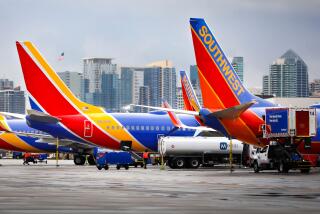Window, aisle or open?
THE SKY IS FALLING, HELL IS freezing over -- and Southwest Airlines is assigning seats. Until last week, the last possibility seemed the least likely. Reviled as it may be, “cattle-car” boarding has been the norm at Southwest since its first flight in 1971, and it has become part of the airline’s legendary efficiency.
Southwest’s experiment will be limited to a handful of flights from San Diego, and any major changes to its boarding policy aren’t likely until at least 2008. It is, however, representative of an industrywide trend, driven in part by the need to squeeze every last penny of revenue from flights. As millions of travelers will discover this weekend and all summer long, the airline industry is still searching for the most efficient way to board a plane.
Bankrupt Northwest Airlines this month junked its back-to-front boarding in coach class, instead allowing its coach passengers to board freely. But first-class, disabled and elite frequent-flier passengers still get on first, and the rest of us still have assigned seats. Northwest said the change has shaved five to 10 minutes off boarding times, allowing the airline to better stay on schedule. United Air Lines last fall also scuttled back-to-front boarding in favor of a window-to-aisle system. Delta Air Lines in February rolled out a complicated scheme in which the back part of the plane boards window-to-aisle, and the process is repeated until coach class is full.
In 2002, America West Airlines tapped industrial engineers at Arizona State University to develop the fastest boarding procedure. They found that a hybrid of back-to-front and window-to-aisle was the quickest with assigned seats. After implementing this system in 2003, America West says it has cut about 20% from its average boarding time.
So why does any of this matter? Because airlines don’t make money from empty planes sitting on the ground waiting for fare-paying passengers to board. One author of the Arizona State study said Southwest’s open seating may be the fastest way to board a plane. Left to their own devices, he said, passengers generally stay out of one another’s way.
So the search for the best way to board a plane may be that rare example of the airlines’ penny-pinching -- unlike removing pillows, blankets and meals from flights -- that also makes flying easier for passengers. Now if only someone could come up with a way to see who will take the seat next to you.
More to Read
Sign up for The Wild
We’ll help you find the best places to hike, bike and run, as well as the perfect silent spots for meditation and yoga.
You may occasionally receive promotional content from the Los Angeles Times.






